You only have so many customers. Many of them are probably happy to write you a review online (especially if it’s as easy as possible). So where should you encourage them to go to post reviews of your business?
If you think the obvious answer is “Oh, I’ll just steer everyone to Yelp and Google+” then you thought wrong. Those sites have review filters that can be pretty paranoid. Yelp even has a policy against asking for a review. Also, some of your customers simply may not want to use those sites, for one reason or another.
Then there’s what I and other local SEOs have experienced: that getting reviews on a diversity of sites can be a big help to your local rankings.
How to pick which review sites might be good to weave into your review-encouragement campaign? I’ve put together this comparison chart to help you figure that out:
There are other good review sites out there, but I focused on the big sites that aren’t specific to any one industry (like YellowPages) and a handful of the big sites that are specific to a particular industry or family of industries (like HealthGrades). I also focused on US sites, as you can tell (although Google+, Yelp, and TripAdvisor aren’t US-specific).
I hope everything made sense at first glance, but in case not, here’s some explanation of each of the columns and headers:
A review is not a review. Some give you more local visibility per-review than others. How? In 5 different ways (that I can think of).
Avg. rankings for broad searches
When you type in any given local search term – “dentists Dallas” or “roofing repair in Tampa” or “jewelry” or “estate attorneys” – you’re probably going to see at least a few directory/review sites in Google’s search results.
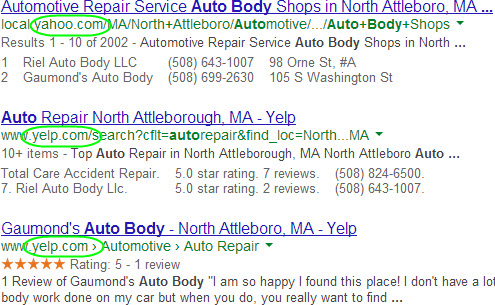
Some of these sites always seem to rank highly – and if potential customers click through to those sites, you’re either visible or you’re not. If you have reviews on those sites, you’re building yourself some nice extra visibility.
Avg. rankings for brand-name searches
What do you see when you search for your business by name? You’ll probably see a page or two of your site, your Google+ Local listing, maybe Facebook page – and several other sites where you’re listed.
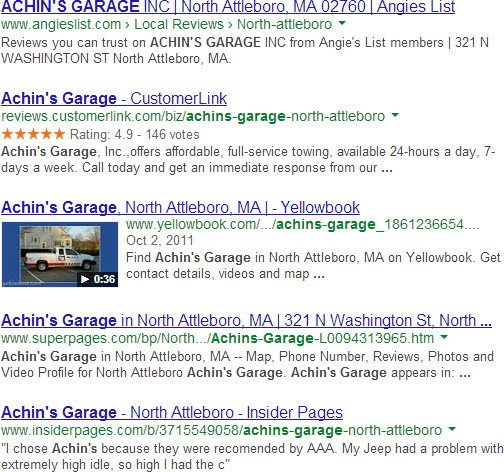
You need reviews on at least some of those sites.
Why? Because many of your potential customers aren’t just picking you out of a hat in the local search results: They’ll find you and your competitors in the local rankings, and then Google your names to see the “dirt” on you. For that matter, maybe they didn’t even find you online originally: maybe they got your name from a friend and just want to learn more about you. The bottom line is that if potential customers like what they see – particularly the reviews – they may just give you a ring.
Review stars in SERPs
As you can see, some sites make their reviews “pop” out in the search results (by using rich snippets).
You want reviews on those sites. The nice thing is that most of them only require one review to have your “stars” show up in the search results. (The exception is Google+ Local, which requires a minimum of 5 or sometimes 4 reviews for you to get the stars.)
Feeds reviews to other sites
You’ll need to have seen my Local Reviews Ecosystem post in order to absorb this one.
Feeds to Bing Places
There’s no such thing as a “Bing review” anymore. The reviews that show up in Bing’s local results come from other sources: Yelp, CitySearch, InsiderPages, and TripAdvisor.
Besides their visibility in Google and on other sites, there are other ways some types of reviews can benefit you.
Top reviewers
Yelp has the “Elite Squad.” Google has the “City Experts” program, and also gives “Top reviewer” status to other people who write lots of Google Plus reviews. A couple other sites have equivalent titles for their most-influential reviewers. Reviews from these sorts of people can help your visibility in all sorts of indirect ways – and they may have some direct effect on your rankings.
Allows owner responses
Can you thank a customer who puts in a good word? Can you address gripes from less-happy customers? Depends on the site.
Badges offered
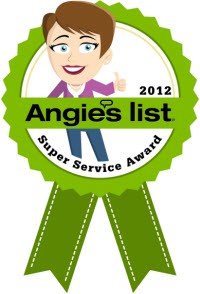 Some sites have badges or buttons that you can use to draw attention to your reviews – to tell customers to check out your reviews on those sites. Pro tip: because these badges will link to your reviews page on a given site, make sure those links open up into a new browser tab. You don’t want people leaving your site to check out your reviews.
Some sites have badges or buttons that you can use to draw attention to your reviews – to tell customers to check out your reviews on those sites. Pro tip: because these badges will link to your reviews page on a given site, make sure those links open up into a new browser tab. You don’t want people leaving your site to check out your reviews.
It won’t necessarily be easy to get reviews on the sites where you need them. Nor can you assume it will be tough to get reviews on sites where you might actually benefit a lot from having a few. You need to know where the banana peels are.
Does not use automated filters
Sorry for the double-negative here, but as you can see on the comparison chart, I wanted “green thumbs-up = good” across the board 🙂 But this one’s real simple: Yelp and Google+ filter reviews. Yelp’s filter is harsher than Google’s filter. TripAdvisor may filter reviews automatically, but I couldn’t tell for certain.
Facebook logins accepted
Some sites don’t require customers to create logins (e.g. a CitySearch username) just to write a review. They let customers use their Facebook usernames. Not only does that eliminate a step for your customers, but it also presents an opportunity for you if you interact a lot with your customers on Facebook and might use it as a way to reach out for reviews.
By the way, Yahoo also lets people use their Google logins, and Angie’s List lets customers use their Facebook, Google, and Yahoo usernames to post reviews. Talk about greasing the skids.
Policy allows asking for reviews
Self-explanatory, except that Yelp is actually the only Grinch site that sees reviews as a taboo subject for an honest business owner and a customer. Google is murky on this one. Angie’s List actually wants you to ask customers. HealthGrades will ship you customized cards to give patients.
—-
By the way, here are a couple great old posts that bit off pieces of the “which review sites should I pick” question:
Mike Blumenthal’s “Which Review Sites Should You Use?” (2010)
Miriam Ellis’s “Edit, Remove and Respond To Reviews – Tools For Conflict Resolution” (2009)
Huge thanks to David Deering of Touch Point Digital Marketing in New Orleans for making my comparison chart not only presentable, but pretty as a peach. I highly recommend his services.
—
Questions? What’s your SWOT analysis of your reviews profile after looking at the comparison chart? Leave a comment!
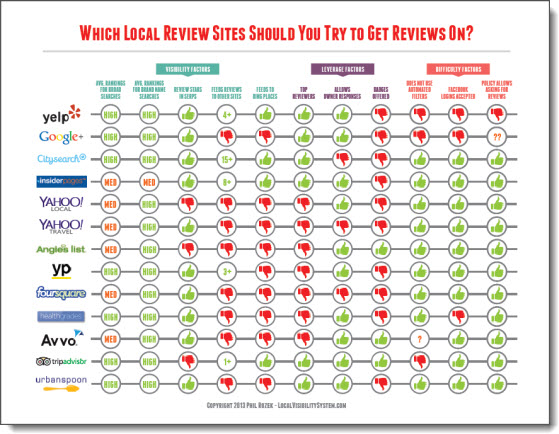

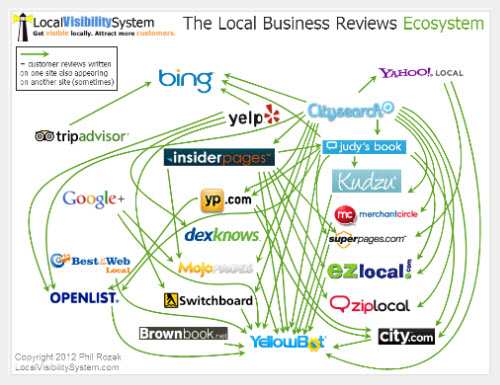


Phil – you rockstar! Epic great post. We’ll have our team reviewing this for sure. Thanks for doing all this work.
Thanks, Matt!
Agreed! Thanks for doing all that work. I hadn’t considered some of those as viable review sites for SERPS but I guess I stand corrected. We will need to steer our clients in some new directions.
The good thing is, of course, that it’s not mutually exclusive. They can still haul in the reviews on the biggest sites, and just pay attention to some of the others on the back burner.
Hey Phil,
Great post! Would you be able to send me a jpeg or other image copy of your “which local sites to get reviews on” pdf? I would love to post that on my company’s forum for our clients to see (with your permission of course). Shoot me an email and let me know either way. In any case, thanks for the great article.
Thanks, Eric. Trying to get it into a nice-looking .jpg. I’ll email you if I’m able to git ‘er dun.
Here you go, Eric – the jpg:
https://bit.ly/1bk0GnB
Holy! Phil! This is great work. What a fantastic resource for the local search community. Thanks for putting this together!
Sure thing, Darren!
Ahaha, Darren, made my day! Great work, “Holy Phil!” 🙂
I appreciate the undue praise, Max 🙂
Thanks for another good piece of the big review picture. The PDF is great, printed it out for my file.
Good deal, Brian. Wanted to do this one for a while.
Phil,
Once again, a great article on reviews. The new chart is great and helpful for the business owner or consultants like us to show our clients where their customers can leave reviews and which sites would be best for them. I love the Local Reviews Ecosystem – I would be on YP.com working on a citation and see that the reviews were from CitySearch. It’s so important when selecting which citation sites a business should claim or be added to if they are in need of reviews, which all businesses are in need of.
The part of leverage factors is helpful for us to pass along to our clients. It’s an ongoing task for us that we are reminding them that they need to put a review plan in place and why. I’m going to checkout Google’s City Experts Program.
Thanks!
Susan
Sure thing, Susan. Glad you like the comparison chart! The “leverage factors” are important, all right.
By the way, Google’s “City Experts” program has only rolled out to a few cities.
Phil,
This is one of the best pieces of Local content I’ve seen in a LONG time. Terrific work.
Hey David,
Thanks a lot!
This came up as a golden nugget. This trumps things like the Periodic table of SEO. Really great work here
That’s high praise (too high), Vadim, but thanks.
I can’t speak for all, but at least for its usefulness for myself and my clients 🙂
Great work here Phil! This will be a long lasting asset for the local search community for sure! Thanks for putting this together!
You’re welcome, Jackson – and thanks!
Epic, epic, epic. Another winner Phil!
I’m always in awe of your posts and this one is right up there with the best!
Thanks, Linda!
Phil, I echo what everyone else is saying!
You and this post are awesome!
I don’t know about that, but thanks, Benjamin!
Phil, Another outstanding contribution! You are now definitely on my Rock Star Local Search status list. It’s very short. Bill
Thanks, Bill.
Great article! Very interesting to see how local search is trending. Now that Google has rolled out recent interface changes like (https://www.chatmeter.com/google-local-changes-requiring-greater-review-management/) and launched Hummingbird, the breadth of your website is what matters. Getting reviews across a variety of sites is absolutely crucial for local rankings in today’s world.
Indeed!
Thank you, Matthew!
Good job. However these are good for USA, but for Italy or Europe have any suggestions?
Hi Mauro,
Phil here.
The only sites I know of that would be the same in Italy or the rest of Europe are Google+, Yelp, and TripAdvisor. I imagine PaginaGialle.it would have the same characteristics as YellowPages.com has.
Great overview Phil, solid info that will help many to improve their visibility.
One thing we often see is that directories get differing amounts of use for a search phrase depending on their region. Yelp, for example, isn’t used nearly as much here in Bend Oregon as it is in Portland, just a couple of hours away. Consequently, our top 20 list of recommended directories for a client having stores in multiple locations often varies for each location.
Thanks again for providing an invormative and actionable read!
Excellent point, Eric. Thanks for that. Yelp does seem to be most popular in larger cities, particularly on the Coasts. I think there’s an interesting study to be had there – on which review sites are popular in different regions.
Great post Phil. Love the Comparison Chart. Totally hit the mark on importance and relevance for Local marketers. Of course, it’s a moving target so we’ll see what Google and the others decide they want to count and focus on next month.
Thanks, Kenny.
Testimonials from our clients are very important and because it was really annoying that certain reviews would get filtered, we focused on posting all testimonials on our website at https://www.jurewitz.com/testimonials/. Thanks Phil for this article! It puts many review different sites out there into perspective and helps me determine which sites are the best to get reviews on for my law practice.
It can be tough for lawyers, as you say. I’d probably focus on Avvo.
Thanks for the advice! Avvo is a good review platform for attorneys that is also in my “must do” list.
EPIC POST!!!
Seems that Citysearch.com is now taking reviews from judysbook.com.
Is that what you are seeing?
I hadn’t noticed that, but I have noticed that sometimes InsiderPages syndicates reviews to CitySearch. Sometimes it’s a two-way street. They’re all owned by the same company. Thanks for the tip.
Hi Phil,
Thank you for another great post. As an attorney, it seems like getting reviews is increasingly difficult. Avvo is great b/c it allows users to leave anonymous reviews. Some clients don’t mind leaving G+ reviews, which requires using their identity, but a lot of clients seem to prefer remaining anonymous.